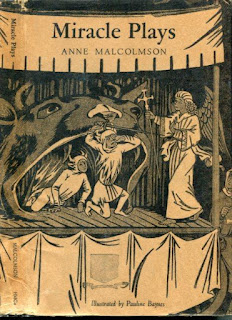Miracle plays
Miracle play is a type of medieval drama derived from the liturgy of the church, depicting events taken either from the Bible or from the lives of the saints, although the latter type is almost nonexistent. In 1744 the editor Robert Dodsley (1703-1764) gave the name of "mystery" from the French plays known as mysteres, to the English plays based upon biblical subjects, reserving the term miracle for the saint's play, but modern criticism favors the use of "miracle" as an all -inclusive term for any of these medieval liturgical dramas.
The miracle plays evolved from brief dramatizations or tropes, such as the Easter Quem quaeritis, which were inserted into the mass in English and Continental catherdals during the tenth century. From this tentative beginning a full-blown dramatic tradition emerged, with entire cycles of plays being presented during great festivals in the fourteenth and fifteenth centuries.
In England the miracle plays were presented on movable wagons, called pageants, in connection with the Corpus Christi celebration.
Miracle play is a type of medieval drama derived from the liturgy of the church, depicting events taken either from the Bible or from the lives of the saints, although the latter type is almost nonexistent. In 1744 the editor Robert Dodsley (1703-1764) gave the name of "mystery" from the French plays known as mysteres, to the English plays based upon biblical subjects, reserving the term miracle for the saint's play, but modern criticism favors the use of "miracle" as an all -inclusive term for any of these medieval liturgical dramas.
The miracle plays evolved from brief dramatizations or tropes, such as the Easter Quem quaeritis, which were inserted into the mass in English and Continental catherdals during the tenth century. From this tentative beginning a full-blown dramatic tradition emerged, with entire cycles of plays being presented during great festivals in the fourteenth and fifteenth centuries.
In England the miracle plays were presented on movable wagons, called pageants, in connection with the Corpus Christi celebration.

0 Comments